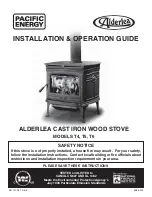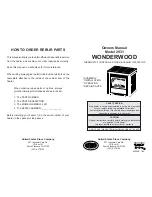
TERMOSOVRANA
28
Instructions for installation, use and maintenance – EN – Rev.03
The minimum section must be 4 dm
2
(for example 20 x 20 cm) for devices whose duct diameter is
lower than 200 mm or 6.25 dm
2
(for example 25 x 25
cm) for devices with diameter greater than 200 mm.
The draught created by the flue must be sufficient, but not
excessive. A too big flue section can feature a too big
volume to be heated and consequently cause difficulties
in the operation of the device; to avoid this, tube the flue
along its whole height. A too small section causes a
decrease of the draught.
The flue must be properly spaced from any
flammable materials or fuels through a proper
insulation or an air cavity.
It is forbidden to let plant piping or air feeding channels
pass in the same flue. Moreover, it is forbidden to create
movable or fixed openings on the same for the
connection of further other devices.
5.1. CHIMNEY CAP POSITION
The draught of the flue depends also on the
suitability of the chimney cap.
Therefore, if it is handicraft constructed, the output
section must be more than twice as big as the internal
section of the flue.
Should it be necessary to exceed the ridge of the roof,
the chimney cap must assure the discharge also in case
of windy weather (Figure 6).
The chimney cap must meet the following requirements:
•
have internal section equivalent to that of the stack.
•
have a useful output section twice as big as the flue internal one.
•
be manufactured in such a way as to prevent the penetration of rain, snow, and any other foreign body
in the flue.
•
be easily checkable, for any possible maintenance and cleaning operation.
Figure 5
Figure 6
Figure 7
(1) AISI 316 steel flue with double chamber
insulated with material resistant to 400°C.
Efficiency 100% excellent.
(2) Refractory flue with double insulated chamber
and external coating in lightweight concrete.
Efficiency 100% excellent.
(3) Traditional clay flue square section with
cavities. Efficiency 80% excellent.
(4) Avoid flues with rectangular internal section
whose ratio differs from the drawing. Efficiency
40% poor.
A+1/2A
A
Max.
A+1/2A
(3)
(1)
(2)
(4)
(1)
Industrial chimney
cap with pre-fabricated
elements – it allows an
excellent discharge of the
smokes.
(2)
Handicraft chimney
cap. The right output
section must be at least
twice as big as the
internal section of the flue
(ideal value: 2.5 times).
(3)
Chimney cap for steel
flue with internal cone
deflector of smokes.
50 cm
(1) In case of flues side by side, a chimney cap
must be higher than the other one of at least 50 cm
in order to avoid pressure transfers between the
flues themselves.
















































